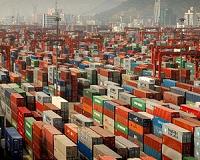| . |  |
. |
Washington (AFP) April 16, 2011 Seven of the world's leading economies including China and the United States faced deep scrutiny over fiscal and financial imbalances Saturday as the G20 group announced a new framework for assessing potential risks to the global economy. A Group of 20 delegation member told AFP the seven "included the G5" -- the United States, France, Britain, Japan and Germany -- and "two big emerging countries," suggesting China and India. The move would boost fraternal scrutiny in the elite G20 club, underscoring the growing worry over how structural problems in one large economy can spill across the world and pull others down -- as became apparent in the 2008-2009 financial crisis. The move fell short of the "name and shame" approach some observers expected, with members apparently uncomfortable with having any official public list of those found substandard by the new G20 guidelines. French Finance Minister Christine Lagarde, who presided over the G20 meeting would only confirm that France was one of the seven countries. But the appearance of China, the United States, Japan and Germany was expected prior to Friday's session. Finance officials called the meeting a solid step ahead for policing the globe's increasingly integrated economy, when policies by the biggest players have long been decided at the national level. US Treasury Under Secretary Lael Brainard said there were already signs of how peer pressure was being taken, citing US President Barack Obama's speech Wednesday outlining an ambitious plan to cut the massive US budget deficit, and internal discussions the Chinese are having on their side of the problem -- their massive trade surplus. After discussions launched late last year, the G20 decided a framework for assessing the most risky economies in a "very mechanical and very objective" manner, Lagarde said. The G20 represents 85 percent of the global economy, and comprises Britain, Canada, France, Germany, the United States, Italy, Japan, South Africa, Saudi Arabia, Argentina, Australia, Brazil, China, South Korea, India, Indonesia, Mexico, Russia, Turkey and the European Union. The seven each had an economy equivalent to four percent or more of the global economy, and were subject to tougher scrutiny. Named to the list, they would now be subject to a "second step" of assessment that could lead to policy prescriptions from their G20 brethren at a summit in Cannes, France in November. Lagarde stressed the use of a structural, data-based and historical approach and the absence of subjective judgement in the G20's "indicative guidelines" for assessing risky imbalances. "It's not as if we decided out of nowhere," she said -- another indication of the depth of problems in the world's leading economies. Already cited by the International Monetary Fund early this week for its yawning fiscal and trade deficits and growing debt burden, the United States was an easy pick for the list. The selection of China was a way of highlighting its contribution to the problem -- its dollar-pegged and widely believed to be undervalued currency, which has helped it build a massive trade surplus with the world and especially the United States. "China should adopt a floating currency system," Brazil's Finance Minister Guido Mantega said after the meeting. "My suggestion is a homogenization, in that everyone will adopt a floating currency. In a statement, the G20 also said it would more closely assess other problems with the global economy, including threatening capital flows, unhealthy reserve accumulation, skewed exchange rates and other symptoms of artificial or troubling imbalances. "Our aim is to promote external sustainability and ensure that G20 members pursue the full range of policies required to reduce excessive imbalances and maintain current account imbalances at sustainable levels," it said. The G20 also took note of sharply rising commodity prices, including food, and the impact of excessive price volatility on food security. The countries agreed on "the need for participants in commodity derivatives markets to be subject to appropriate regulation and supervision" and called for more transparency in cash and derivatives markets. But the group noted that, despite soaring oil prices in the wake of the upheaval across the Middle East and North Africa, and after Japan's March 11 earthquake and tsunami disaster, there was no real shortage of energy supplies in the world.
Share This Article With Planet Earth
Related Links The Economy
 China growth eases, inflation hits 32-month high
China growth eases, inflation hits 32-month highBeijing (AFP) April 15, 2011 China said Friday its robust economy slowed slightly in the first quarter of 2011 but inflation hit a 32-month high, suggesting Beijing's efforts to rein in soaring costs are still falling short. Gross domestic product in the world's second-largest economy expanded 9.7 percent on year in the first three months of the year, the National Bureau of Statistics said, fuelling market expectations ... read more |
|
| The content herein, unless otherwise known to be public domain, are Copyright 1995-2010 - SpaceDaily. AFP and UPI Wire Stories are copyright Agence France-Presse and United Press International. ESA Portal Reports are copyright European Space Agency. All NASA sourced material is public domain. Additional copyrights may apply in whole or part to other bona fide parties. Advertising does not imply endorsement,agreement or approval of any opinions, statements or information provided by SpaceDaily on any Web page published or hosted by SpaceDaily. Privacy Statement |